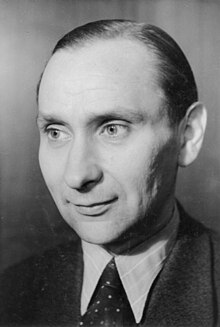Günter Stempel
| Günter Stempel | |
|---|---|

Günter Stempel
|
|
| Born | 17 November 1908 Breslau, Germany |
| Died | 22 October 1981 (aged 72) Celle, West Germany |
| Occupation | Lawyer and politician |
| Political party | LDPD |
Günter Stempel (17 November 1908 – 22 October 1981) was a German politician (LDPD). He was involved in the formation of the German Democratic Republic (GDR), despite which he was a victim of political repression in both the GDR and the USSR.
Stempel was born in Breslau (now Wrocław, Poland). His father was a doctor. He studied law, passing his first level national law exams in 1933. He was unable to progress to the next stage academically by studying for a doctorate in law because he did not wish to become a member of the country's ruling NSDAP (Nazi party). He was nevertheless able to work in a Berlin law firm between 1933 and 1939. During World War II Stempel became the legal counsel to businesses critical to the war effort, and he was not conscripted for military service.
At the end of the war, Stempel joined the Liberal Democratic Party (LDPD (Liberal-Demokratische Partei Deutschlands)), and in September 1945 he was appointed the party's Organisation Secretary, serving from 1948-1950 as the LDPD's General Secretary. From May 1945, the central part of Germany became administered as the Soviet occupation zone. For Stempel it was the Liberal Democrats' task "to gather together and look after the middle class elements in the Soviet zone of influence.
In 1949 he was a member of the German People's Council, which had been established the previous year in the Soviet occupation zone. This was redesignated in October 1949 as the Provisional People's Chamber (national legislature) at the same time as the occupation zone itself was redesignated as the German Democratic Republic, a separate Soviet sponsored German state to the west of the Oder-Neisse line and divided politically (and, increasingly, physically) from what had been the post-war occupation zones controlled by the Americans, British and French armies. By this time the contentious merger that in April 1946 created the Socialist Unity Party (SED/Sozialistische Einheitspartei Deutschlands) had created many of the preconditions for a return to one-party dictatorship. However, whereas the Hitler government had simply banned opposition political parties, the new government in East Germany pursued the same outcomes by creating a power structure that merely controlled them. Opposition parties naturally resisted control by the SED, and it was the resulting tensions that provide the context for the rest of Stempel's political career.
...
Wikipedia
